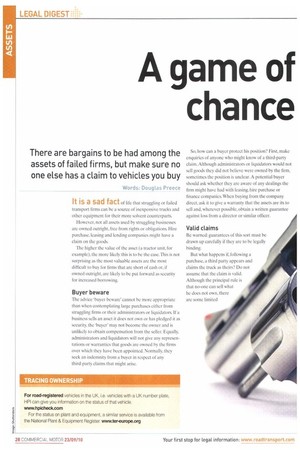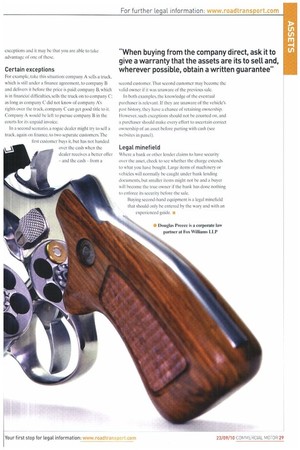A game of chance
Page 28

Page 29

If you've noticed an error in this article please click here to report it so we can fix it.
There are bargains to be had among the assets of failed firms, but make sure no one else has a claim to vehicles you buy
Words: Douglas Preece
It is a sad fact of life that struggling or failed transport firms can be a source of inexpensive trucks and other equipment for their more solvent counterparts.
However, not all assets used by struggling businesses are owned outright, free from rights or obligations. Hire purchase. leasing and lending companies might have a claim on the goods.
The higher the value of the asset (a tractor unit, for example), the more likely this is to be the case. This is not surprising as the most valuable assets are the most difficult to buy for firms that are short of cash or, if owned outright. are likely to be put forward as security for increased borrowing.
Buyer beware
The advice 'buyer beware' cannot be more appropriate than when contemplating large purchases either from struggling firms or their administrators or liquidators. If a business sells an asset it does not own or has pledged it as security. the 'buyer' may not become the owner and is unlikely to obtain compensation from the seller. Equally, administrators and liquidators will not give any representations or warranties that goods are owned by the firms over which they have been appointed. Normally, they seek an indemnity from a buyer in respect of any third-party claims that might arise. So, how can a buyer protect his position? First, make enquiries of anyone who might know of a third-party claim. Although administrators or liquidators would not sell goods they did not believe were owned by the firm, sometimes the position is unclear. A potential buyer should ask whether they are aware of any dealings the firm might have had with leasing. hire purchase or finance companies. When buying from the company direct, ask it to give a warranty that the assets are its to sell and, wherever possible. obtain a written guarantee against loss from a director or similar officer.
Valid claims
Be warned: guarantees of this sort must be drawn up carefully if they are to be legally binding.
But what happens if, following a purchase, a third party appears and claims the truck as theirs? Do not assume that the claim is valid. Although the principal rule is that no-one can sell what he does not own, there are some limited exceptions and it may be that you are able to take advantage of one of these.
Certain exceptions
For example, take this situation: company A sells a truck, which is still under a finance agreement, to company B and delivers it before the price is paid: company B, which is in financial difficulties, sells the truck on to company C; as long as company C did not know of company A's rights over the truck, company C can get good title to it. Company A would be left to pursue company B in the courts for its unpaid invoice.
In a second scenario, a rogue dealer might try to sell a truck, again on finance, to two separate customers. The first customer buys it, but has not handed over the cash when the dealer receives a better offer — and the cash — from a second customer. That second customer may become the valid owner if it was unaware of the previous sale.
In both examples, the knowledge of the eventual purchaser is relevant. If they are unaware of the vehicle's past history, they have a chance of retaining ownership. However, such exceptions should not be counted on, and a purchaser should make every effort to ascertain correct ownership of an asset before parting with cash (see websites in panel).
Legal minefield
Where a bank or other lender claims to have security over the asset, check to see whether the charge extends to what you have bought. Large items of machinery or vehicles will normally be caught under bank lending documents, but smaller items might not be and a buyer will become the true owner if the bank has done nothing to enforce its security before the sale.
Buying second-hand equipment is a legal minefield that should only be entered by the wary and with an experienced guide.
































































































































